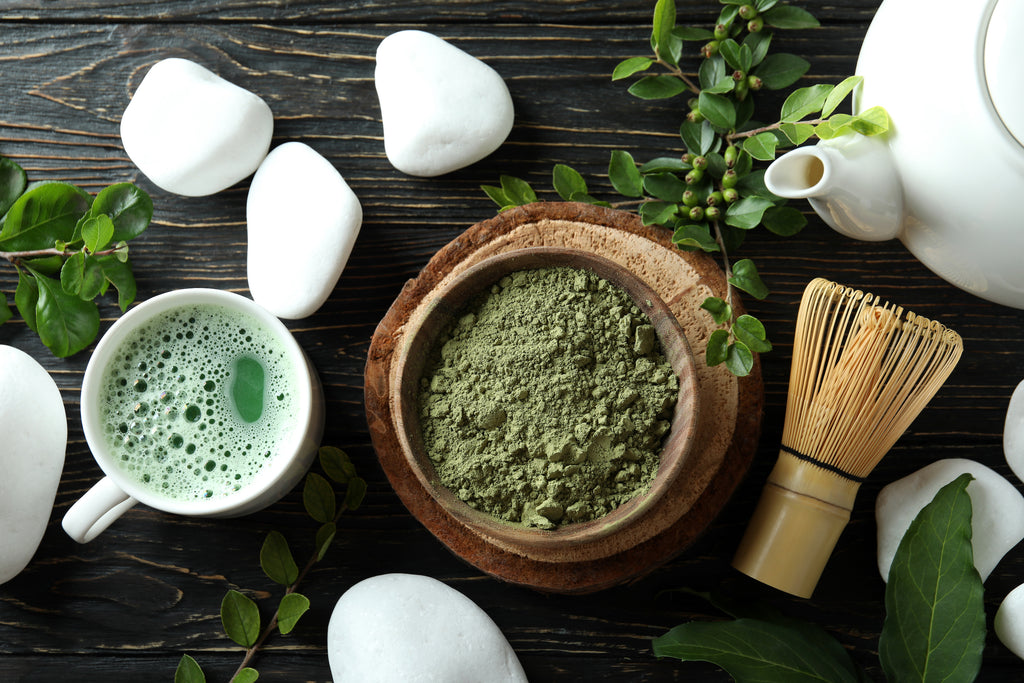How can matcha green supplements benefit your health?
Matcha green tea is a type of green tea that is made from ground tea leaves and is usually consumed as a beverage. It has been used in traditional Japanese culture for centuries and has gained popularity in recent years due to its potential health benefits and as a supplement.

Matcha green tea is a rich source of antioxidants, particularly catechins, which are compounds that can help protect cells from damage caused by free radicals. Some of the specific catechins found in matcha include epicatechin and epicatechin gallate. These compounds are thought to contribute to the antioxidant properties of matcha green tea and may have a variety of health benefits. For example, some research suggests that the catechins found in matcha green tea may help reduce the risk of certain types of cancer, such as breast, ovarian, and colon cancer (1, 2).

Matcha green tea is also a natural source of theanine, an amino acid that is thought to have calming effects on the mind and body. Theanine is believed to help promote relaxation and improve mental focus, and some research suggests that it may have beneficial effects on mental well-being (3). In addition, theanine may have a role in the regeneration of nerve growth factor (NGF), which is a protein that plays a role in the growth and maintenance of neurons (4).
Matcha green tea is also a source of other nutrients, including vitamins and minerals. For example, it is a good source of vitamins A, C, E, and K, as well as minerals such as potassium, calcium, and iron (5). These nutrients are essential for maintaining overall health and well-being.
Some research suggests that regular consumption of matcha, may have a variety of health benefits, including:
- Improving cardiovascular health: Green tea, including matcha, is thought to have a number of beneficial effects on cardiovascular health. Some research suggests that it may help lower blood pressure and reduce the risk of stroke and heart disease (6).
- Managing body weight: Green tea, including matcha, is often included in weight loss and weight management programs due to its potential to help increase energy expenditure and fat oxidation (7). However, it is important to note that the effects of green tea on weight loss may be modest and that it should be consumed as part of a balanced diet and regular exercise program.
- Reducing the risk of certain types of cancer: Some research suggests that the antioxidants found in green tea, including matcha, may help reduce the risk of certain types of cancer, such as breast, ovarian, and colon cancer (1, 2).
- Improving mental well-being: Theanine, an amino acid found in green tea, including matcha, is thought to have calming effects on the mind and body and to help promote relaxation and improve mental focus (3).It is important to note that while there is some evidence to support the potential health benefits of matcha green tea, more research is needed to fully understand these effects and to determine the optimal dosage and duration of use. In addition, the effects of matcha green tea can vary from person to person and may be influenced by factors such as age, overall health, and the presence of other substances in the body.
In conclusion, matcha green tea is a type of green tea that is rich in antioxidants and other nutrients and may have a variety of potential health benefits. While more research will yield even greater understanding to fully understand these effects, consuming matcha green tea as part of a balanced diet and regular exercise program may have positive effects on overall health and well-being.
References:
- Khan, N., Afaq, F., & Mukhtar H. (2003). Green tea and cancer: biologic and therapeutic implications. Cancer letters, 201(2), 139-149.
- Kaur, G., & Kapoor, H. C. (2013). Green tea and its polyphenolic catechins: a review of nature, occurrence, dietary intake and pharmacological activities. Food and chemical toxicology, 51, 15-25.
- Lu, K., Gray, M. A., Oliver, C., Liley, D. T., Harrison, B. J., & Bartholomeusz, C. F. (2004). The acute effects of L-theanine in comparison with alprazolam on anticipatory anxiety in humans. Human psychopharmacology: clinical and experimental, 19(7), 457-465.
- Egashira, N., Mishima, K., Iwasaki, K., Fujita, T., Oishi, R., & Oishi, T. (2005). Theanine prevents memory impairment induced by repeated cerebral ischemia in mice. Brain research, 1032(1), 214-219.
- USDA National Nutrient Database for Standard Reference. (n.d.). Matcha, dried powder. Retrieved from https://ndb.nal.usda.gov/ndb/foods/show/23058
- Yang, Y. C., Lu, F. H., Wu, J. S., Wu, C. H., & Chang, C. J. (2004). The protective effect of habitual tea consumption on hypertension. The American journal of clinical nutrition, 80(2), 728-733.
- Dulloo, A. G., Duret, C., Rohrer, D., Girardier, L., Mensi, N., Fathi, M., ... & Schutz, Y. (1999). Efficacy of a green tea extract rich in catechin polyphenols and caffeine in increasing 24-h energy expenditure and fat oxidation in humans. The American journal of clinical nutrition, 70(6), 1040-1045.



